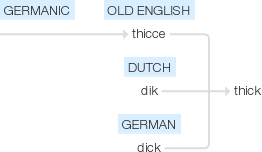Thick
Old English thicce, of Germanic origin; related to Dutch dik and German dick .
wiktionary
From Middle English thicke, from Old English þicce(“thick, dense”), from Proto-West Germanic *þikkwī, from Proto-Germanic *þekuz(“thick”), from Proto-Indo-European *tégus(“thick”).
etymonline
thick (adj.)
Old English þicce "dense, viscous, solid, stiff; numerous, abundant; deep," also as an adverb, "thickly, closely, often, frequently," from Proto-Germanic *thiku- (source also of Old Saxon thikki, Old High German dicchi, German dick, Old Norse þykkr, Old Frisian thikke), from PIE *tegu- "thick" (source also of Gaelic tiugh). Secondary Old English sense of "close together" is preserved in thickset and proverbial phrase thick as thieves (1833). Meaning "stupid" is first recorded 1590s. Related: Thickly.
As a noun, "the thick part" (of anything), from mid-13c. Phrase through thick and thin, indicating rough or smooth going, hence "unwaveringly," is in Chaucer (late 14c.); thick-skinned is attested from 1540s; in figurative sense from c. 1600. To be in the thick of some action, etc., "to be at the most intense moment" is from 1680s, from a Middle English noun sense.
